Wet-nursing: Meet the mums who breastfeed each other's babies
Everywhere we look there seems to be a new story about a mum breastfeeding someone else's child, but what's wet nursing all about?
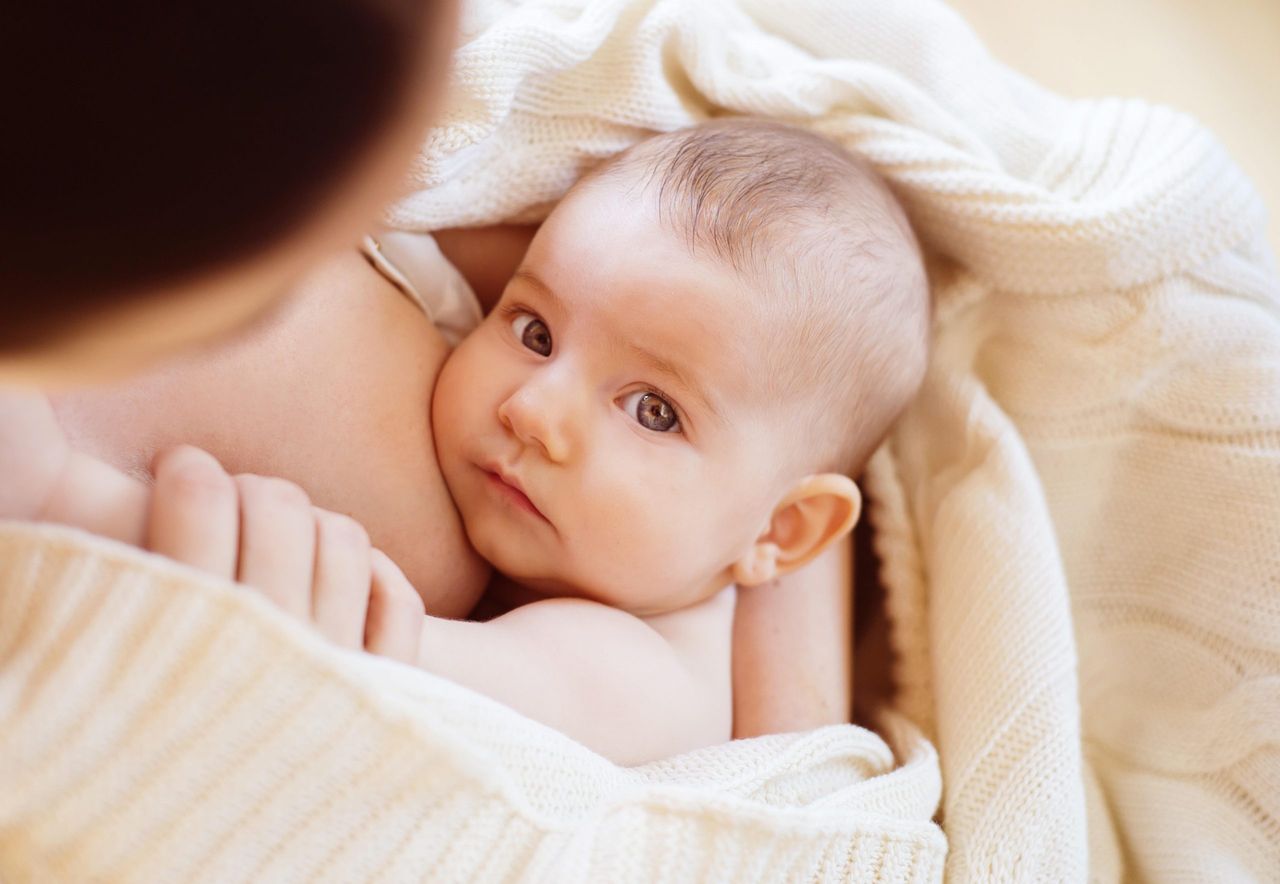
Breastfeeding - or more specifically the stigma attached to it – never seems to be out of the news. In just the past few days, dozens of nursing mums have 'gone viral': at a wedding in a cocktail dress, in their army uniform, staging protests in a mall or being offered free burritos for feeding in public.
Even the Oscars had its own breastfeeding story, as the world asked, how come the boobs that win such praise on the red carpet get relegated to the toilets when celebrity mums need to express milk for their babies?
Little by little, it feels like women are pushing for more respect for the very natural act of feeding their babies. Nursing in public, pumping at work – it's slowly becoming less and less taboo. But what if a woman breastfeeds another woman's baby?
In a world that likes to think of breasts as sex objects, the idea of 'wet-nursing', or 'cross nursing' as it's sometimes known, still seems to have the power to shock or even revolt people. Milli Hill meets the women who breastfeed each other's babies, to find out more about this breastfeeding choice.
When I set out to write this article, I thought I might struggle to find women to share their story. I'd seen the occasional report of wet-nursing in the news, most recently Lacey Dangerstone from Fort Worth in Texas who has fed 12 babies for other mothers. But in spite of being a fairly seasoned breastfeeder myself, wet-nursing is not something that's ever come up on my radar, and I assumed that it was... well... let's say, a bit 'niche'.
I could not have been more wrong.
One quick post on social media and I had a flood of contacts from women who had fed babies that were not their own, directly from their own breast.
GoodtoKnow Newsletter
Parenting advice, hot topics, best buys and family finance tips delivered straight to your inbox.
Some, like celebrity Salma Hayek, who famously breastfed a hungry newborn baby in Sierra Leone, did so in 'one-off' situations where there was an urgent need. Samantha Gadsden, 42, from South Wales, was an experienced breastfeeding mum of three, and when a friend called, desperate for help as she was in hospital with her toddler and needed someone to take her baby, she didn't hesitate to offer to feed him from the breast.
'The mum said she had been hoping I would offer as he had never had a bottle. He took to the breast straight away and was very happy, although my 10 month old wasn't as impressed and soon joined in on the other breast!

Samantha Gadsden stepped in to breastfeed a friend's child in an emergency, and has gone on to help other mums in the same situation
'I fed him through the night, much in awe of mums of twins, as my husband had to wait on me hand and foot. He slept in our side car cot under his mother's wrap, I thought the familiar smell was very important.'
Samantha has gone on to feed other babies for mums in need of help, and finds it hard to understand the stigma attached. 'I have met a lot of prejudice and people who think it's disgusting', she told me. 'Some would argue that a baby should just be given formula, but I am aware that World Health Organisation guidelines rate donor milk above formula. In an emergency situation when faced with a baby who can't tolerate formula, or has never had a bottle, I wouldn't leave a baby to suffer.'
Many other women echoed this sentiment, that taking another woman's baby to your breast simply felt like, 'the right thing to do', and were baffled as to why this would be judged harshly while giving formula or cows' milk was felt to be more 'normal'.
'I fed my friend's baby after her traumatic birth', one mum told me. 'She was in pain and her baby would not latch on. It seemed like the obvious solution, and the baby took to breastfeeding with her much more easily after that.'
Another mum, Sarah Holdway from Yorkshire, explained that she had wet-nursed on a few occasions to help people out, and that each time it had felt, 'completely normal': 'There are so many myths and misnomers about breastmilk that people can not understand why anyone would share it! But imagine if more mothers got together and shared, their love, their milk, their wisdom - I suspect many good things would come of it.
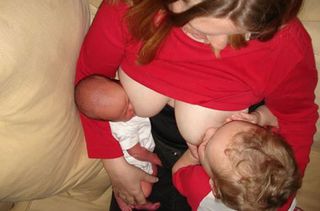
Yorkshire mum Sarah Holdway has wet-nursed on a few occasions and says it felt 'completely normal'
'I feel like we have forgotten the art of being friends with other women and sharing the load', she added.
For some mums, this 'sharing the load' goes beyond one-off, emergency situations. Several mothers got in touch with me to explain how wet-nursing had become a lifestyle for them so that they and another mother could combine breastfeeding with part time work, without having to pump or give formula.
Heather Hilton and Randi Muncher, from Cedar Park in Texas, have been nursing each other babies since they were a few days old – they are now 19 months and 13 months. They are close friends and work together as midwives in the same birth centre, and their milk-sharing relationship began when Randi was initially struggling to make enough milk for her baby Sophie.
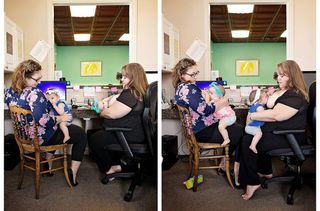
Image: Cori Bessard Photography Left: Randi nursing her daughter Sophie, Heather nursing her daughter Riley Right: Randi nursing Heather's daughter Riley, Heather nursing Randi's daughter Sophie
Knowing each other well – whether you use donated milk or wet-nurse – is a way of improving safety, explains Emma Pickett, from the Association of Breastfeeding Mothers. 'Women are likely to have relationships with the women who breastfeed their children, have an understanding of their health status and drug and alcohol intake, and trust is likely to be high. There are risks with any choice but it's not for us to imply that the use of formula milk is necessarily "safer".'
For Heather and Randi, sharing expressed milk naturally evolved into wet-nursing. 'We each had our babies at the birth center', Heather explained. 'If one of us was busy, whoever was free would nurse the babies. It's never been weird or something we have had to talk about. We are two lactating moms with very similar diets, free of diseases or drugs with babies six months apart. To me, it would be weird if we didn't wet nurse.'
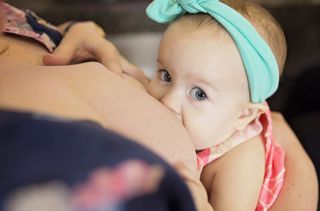
Image: Cori Bessard Photography
Randi nursing Heather's daughter, Riley
Heather's view on why wet-nursing is often harshly judged was insightful: 'I think as a culture, we have adopted this mentality that you have to do everything on your own. This is such a shame. We are isolating young mums - no wonder our postnatal depression rates are rising! No wonder breastfeeding fails so often! We are shaming mums for admitting they need help, when we should be celebrating it! It truly takes a village to raise young children.'
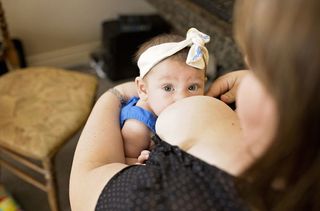
Image: Cori Bessard Photography
Heather nursing Randi's daughter, Sophie
Her words struck a chord with me. I've breastfed three children over the past eight years, and at times I've felt under tremendous pressure, knowing that I was the only person who could really take care of the tiny soul I loved so much. It's had its magic, but it's also been fairly relentless. How much easier might life have been had I considered that another woman might have helped me 'share the load'?
So often we can become prisoners of our own prejudice. How wonderful that some women are, very quietly, choosing to disregard taboo, and simply get on with helping each other out. As one mum put it to me, 'Wet-nursing? Yeah, I've done it. No biggie!'
Trusted, informative, and empathetic – GoodToKnow is the ultimate online destination for parents. At GoodtoKnow, our mission is 'simple': we're trying to make sense of parenthood. On the site, you'll find everything you need for a happy, healthy family life. Our huge archive of content includes more than 18,000 articles and 1,500 how-to videos. These include expert-backed advice features on parenting, dealing with relationship changes after having a baby, self-care for mums and managing your family finances. We also feature tried-and-tested product reviews and buying recommendations for every stage of family life - from prams and Moses baskets to birthday gifts and top toys.